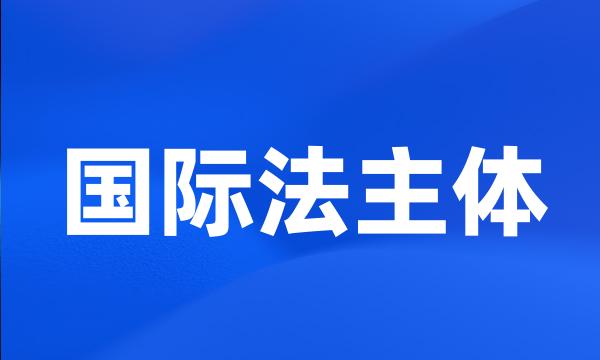国际法主体
- 名subject of international law
 国际法主体
国际法主体-
个人作为国际法主体新探
The New Discussion on the Subject of International Law
-
试论国际法主体问题
On the Subject of International Law
-
论人类的国际法主体地位
On the Subject Status of Mankind in International Law
-
如能最大化自己的利益,国际法主体就会趋向于选择合作。
If maximize their own interests , a subject of international law will tend to choose cooperation .
-
国际法主体对因突发性事件而引发的外交危机所进行的临时性、应急性的外交决策,一般称为危机外交决策。
The decision-making of crisis diplomacy is the temporary and lash-up decision-making that the international actors solve the crisis .
-
对于个人作为国际法主体的问题在现代国际法上是一个颇有争议的国际法基本理论问题。
The question of the individual as subject of international law is the controversial question about the fundamental theory in international law .
-
危机外交是在非正常外交状态下,国际法主体之间为解决外交关系危机而进行的外交活动。
The crisis diplomacy is the diplomatic action that the international actors solve the diplomatic crisis under the condition of abnormality of diplomacy .
-
反之,各个国际法主体更有可能选择背离,也就是不进行合作。
Conversely , all subjects of international law will be more likely to choose to deviate from , that is , do not cooperate .
-
论个人作为国际法主体问题&由《联合国海洋法公约》有关个人的规定引起的思考
On Individuals as the Subject of International Law : Reflections on the Rules for Individuals in United Nations Convention on the Law of the Sea
-
国家奥委会如果具有国际法主体地位,将更有利于国家奥委会在奥林匹克运动中处理与别的主体的关系,这也是本文试探性探讨的一个问题。
If NOC has the status of international person , it is good for the management of relation between NOC and other subjects of Olympic .
-
这就使得各国际法主体参与国际关系,做出战略选择的过程变成一场博弈的过程。
This makes the process in which the subjects of international law participate in international relation and make the strategic choice into a process of the game .
-
但实践中由于国际法主体间利益的不平衡性,保留成为缔约过程中,维护缔约方利益的手段。
However , due to the unbalance of the interests among all the subjects of the international laws , reservation becomes a means to maintain the interest of the contracting parties in the process of contract .
-
当然,我们并不否认经济利益是国际法主体作出决策的重要依据之一,成本和收益也是推动个人或国家选择某项战略的重要驱动力。
Of course , we would not deny that economic interests are important basis for making decision , costs and interests could be important driving force which can promote an individual or country to make a choice .
-
依据权利义务标准,环境NGO已具备有限的国际环境法主体资格。
According to the standards of right and obligation , environmental NGO already has a limited subject qualification of international environmental law .
-
个人不是国际法的主体。
The individual is not the subject of international law at all .
-
个人是国际法的主体,但不是唯一的主体;
The individual is the subject of international law but not the unique one ;
-
国家是国际法的基本主体。
State is basic subject in international law .
-
论国际法的特殊主体
On the Special Subject of International Law
-
基于以上分析,针对讨论的国际环境法的主体,提出自己的观点:国际环境法的主体应该有所调整,顺应时代的发展。
Based on the above analysis , in view of the discussion of the main body of international environmental law , proposed own viewpoint : the main body of international environmental law should be adjusted , with the development of The Times .
-
国际组织作为国际法主体,与国家一样也应当为其国际不法行为承担法律责任。
International organizations as subjects of international law , should take the legal responsibility for its internationally wrongful acts .
-
国际法是国际行为主体之间相互交往应当遵守的规范。
As we know , international law is the norm by which the international subject should obey in the communications .
-
它是国际法中的特殊主体,它不同于一般的国际组织,具备了联邦国家的诸多因素。
EU is a special subject of international law because it is different from the general international organization and has some federal structure elements .
-
由于目前的《外空条约》所调整的对象是国家和国际组织等国际法主体,私营企业的外层空间活动被视为相关国家的行为,由该国家承担由此产生的法律后果。
At present , the treaties in outer space only govern the activities of nations and international organizations , so the activities of the private enterprises have being looked as relative government activity , And the legal consequences of these activities will be taken by the relative governments .
-
国家和国际组织都是国际法的主体,调整国家责任的法律规则经过某些变通后,可以类推适用于国际组织。
Nations and international organizations are the subjects of international law . Legal rules mediating responsibility of nations , with some flexibility , by analogy , apply to international organizations as well .
-
国际贸易公法当然成为国际贸易法的主体部分,而贸易法统一的问题就是主权的问题。
The part of public law became the main part of international trade law certainly , so the problem of sovereignty just the problem of uniformity .
-
在一定条件和有限范围内承认某些国际环境非政府组织的国际环境法的主体地位。
Under certain conditions admitted that some of the international environmental non-governmental organizations and the limited range of the subject status of the international environmental law .
-
除了要受到国际法规则以及道德约束之外,国际法主体是否遵循某一规则更多的会考虑到自身的利益。
In addition to being bound by the rules of international law and ethics , the interests of a subject of international law rules will be taken into most consideration in whether or not comply with a rule .
-
国际条约是国际法的重要渊源,也是国际法主体之间缔结的确定相互关系中权利与义务的协议。
The international treaty is an important source of the international law and a main body of the international law .
-
国际环境法作为一个独立的法律部门,其主体与传统的国际法主体有所不同。
International environmental law as an independent law department , the main body of international law the main body is different from traditional .
-
由于缺乏统一的立法机关和强制机构,国际法的实施在很大程度上取决于国际法主体的自主决策。
Due to the lack of unified legislature and enforcement agencies , the implementation of international law to a large extent depends on the autonomous decision-making of the subject of international law .
